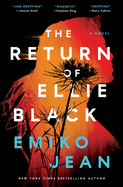
The vulnerability of teenage girls is the pulsebeat of Emiko Jean's The Return of Ellie Black, a crafty thriller in which not just misogyny but classism play villainous roles.
Ellie Black has been missing since she was 17. Two years later, the Coldwell, Wash., girl is found in the Capitol State Forest, two hours from where she was abducted. Coldwell police detective Chelsey Calhoun is working the case, but she can get only so much out of Ellie: something about waking up in darkness after her kidnapping, something about a man with a red bandana on his face. A doctor has confirmed that Ellie was abused in captivity, making the girl's reluctance to relive what happened understandable, and yet Chelsey begins to suspect that Ellie's reticence is obfuscation; "What are you hiding?" she finds herself wondering. She's also aware that the ferocity of her interest in justice for Ellie reflects her own story: Chelsey's older sister died gruesomely when Chelsey was 14.
While Chelsey's perspective dominates the novel, Jean (Mika in Real Life) has collaged it with the viewpoints of other characters--Ellie's working-class parents, her boyfriend, and so on--to present an intimate small-town portrait. Ellie, too, takes the point-of-view reins; in interspersed chapters, she replays what happened to her, eventually revealing how she escaped her captors. As for the other question driving The Return of Ellie Black: Who held her captive? Even readers who don't totally buy the book's answer will probably agree that it's the right one. --Nell Beram, author and freelance writer

